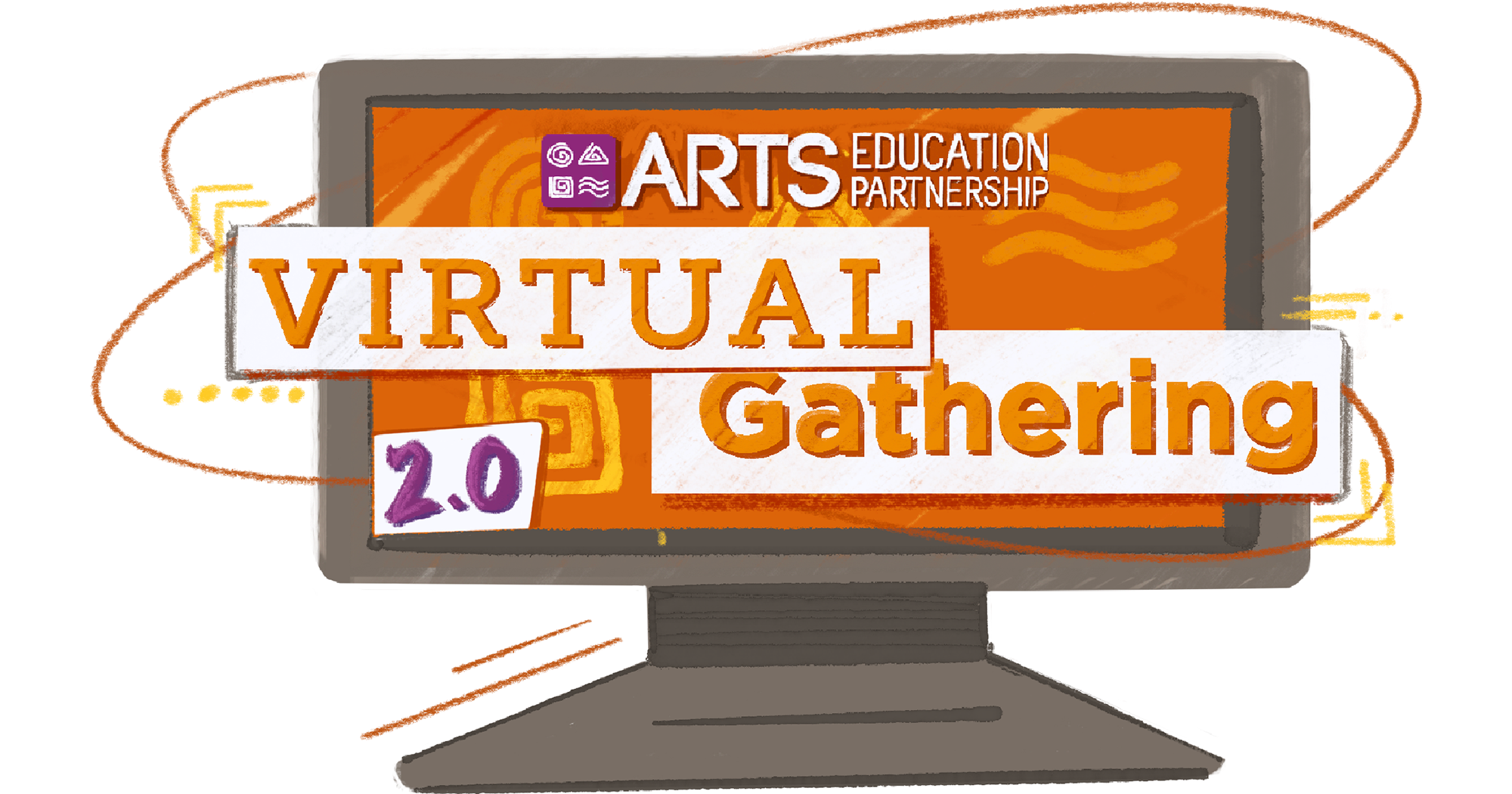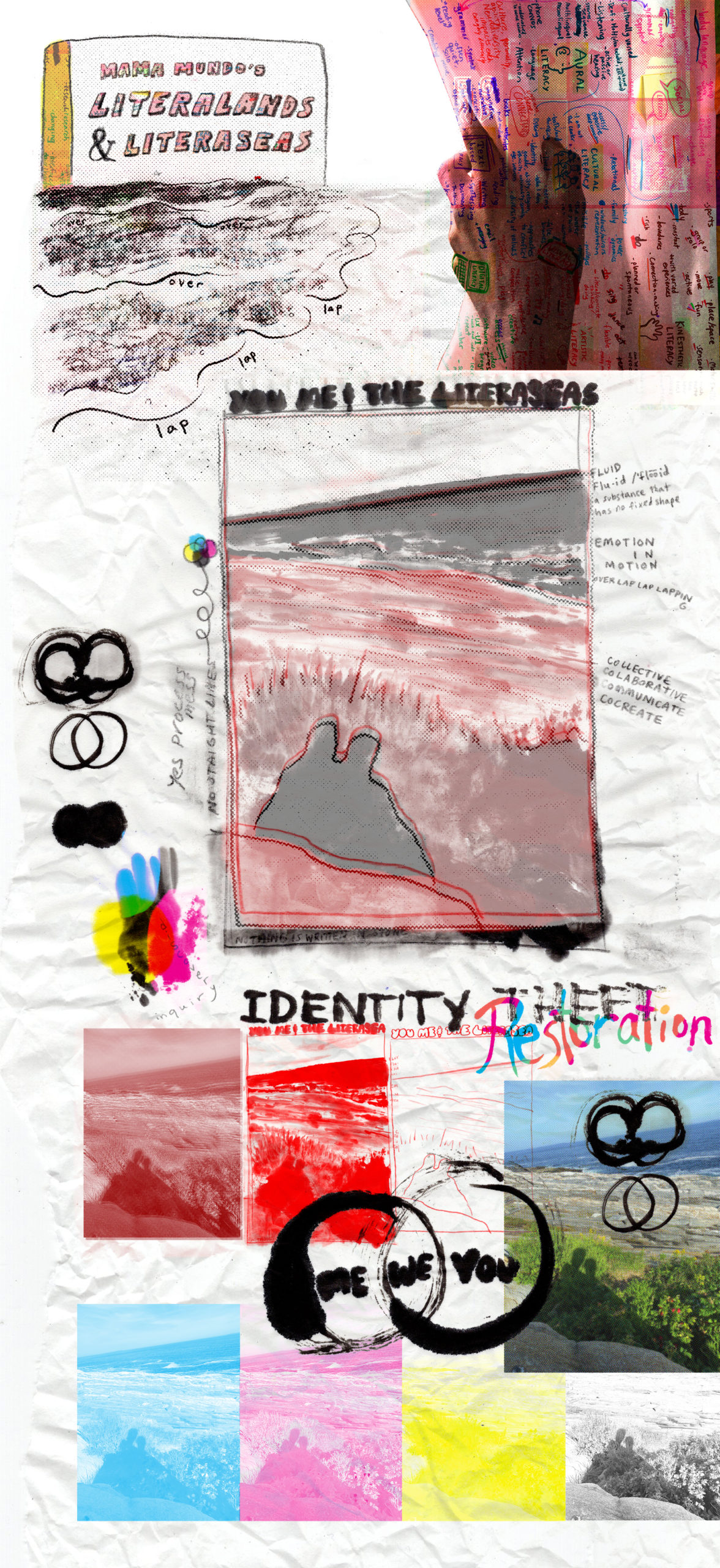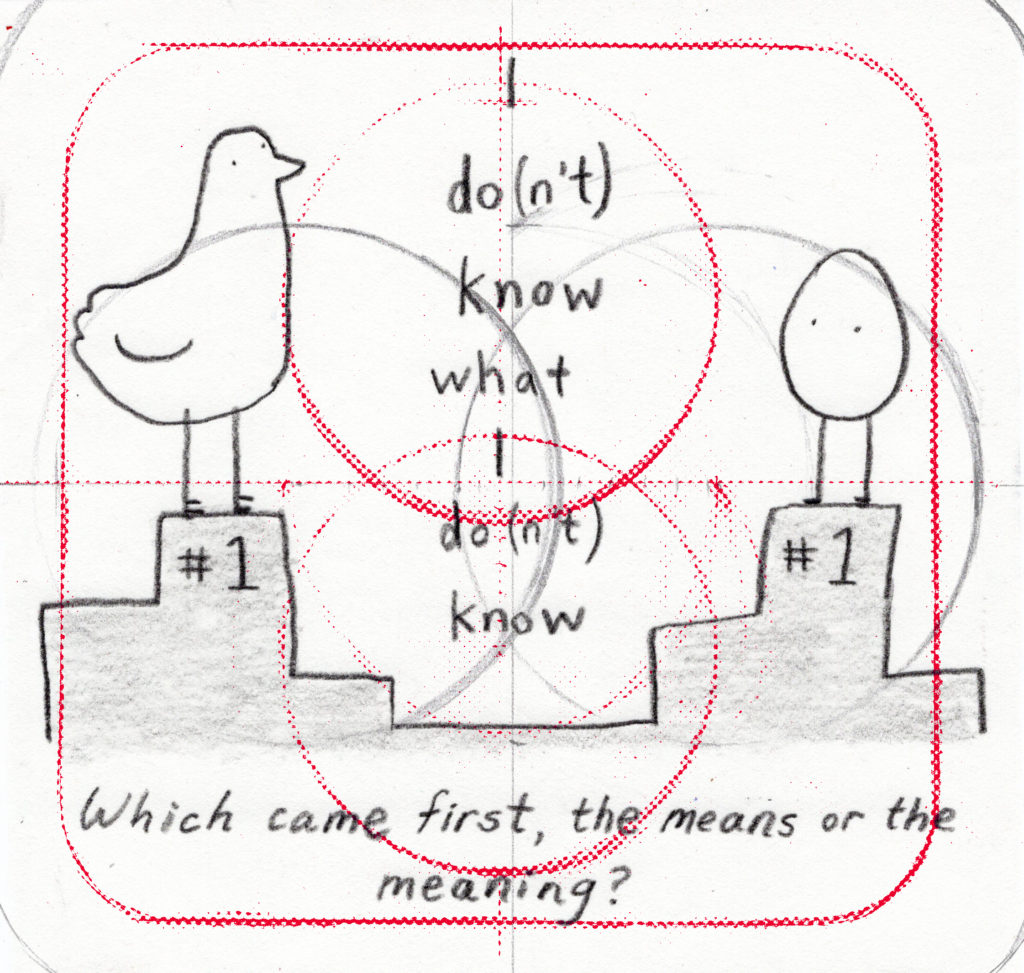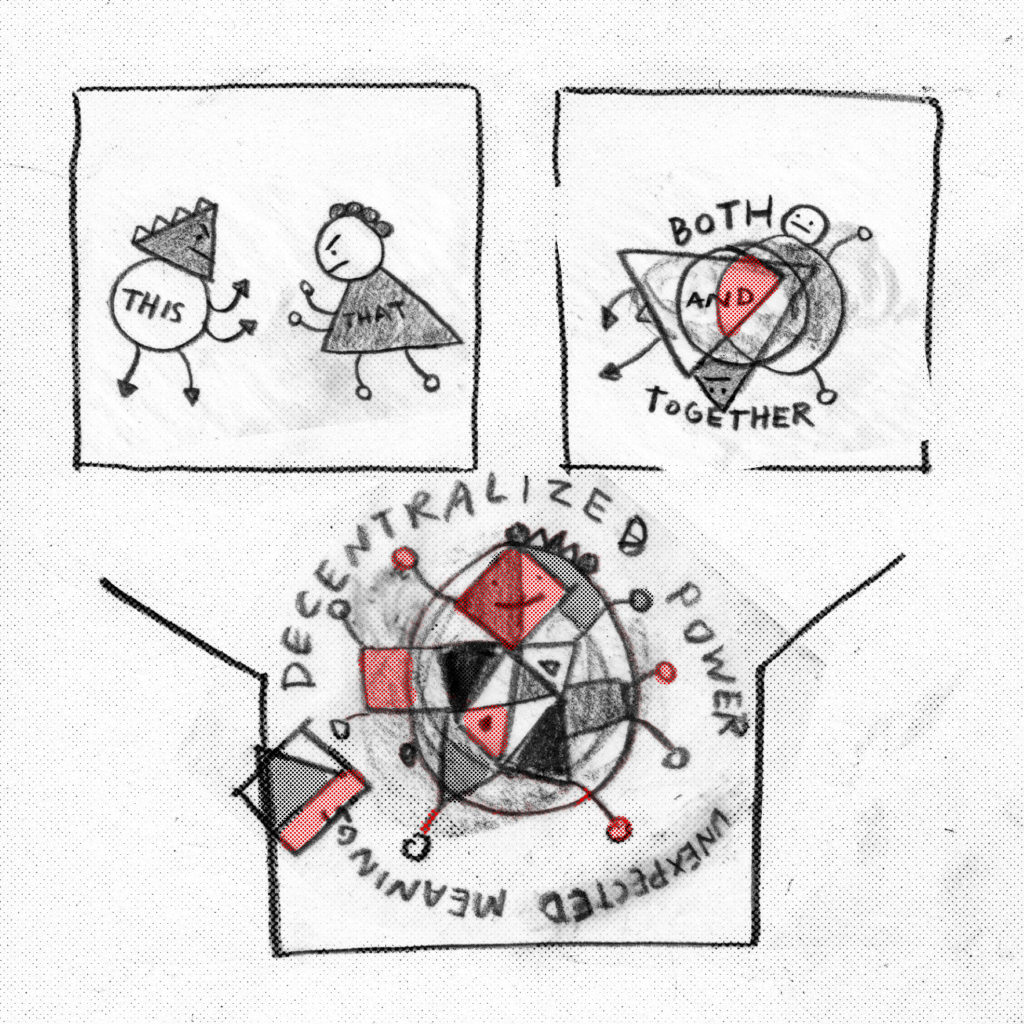In September 2021, AEP welcomed more than 550 participants to the AEP Virtual Gathering.
This page includes all available resources from this online event.

All Session Resources
Invisible
TUESDAY, SEPT. 14
Building a Holistic Narrative About Arts Education
Plenary Session
Video Recording
The education landscape has changed dramatically over the past two years due to national and global events, and these shifts brought new and increased awareness about supporting young people not only in their learning but also for their social and emotional well-being. For decades, arts education leaders have aimed to expand our narrative about the value of arts education beyond academic impacts, but it’s more vital now than ever to double down on the shift to show how the arts holistically contribute to a young person’s academic, community and social experiences. This session identifies strategies to communicate the comprehensive value of arts education — including research, data and storytelling — and elevate the role of arts education in policymaking.
Presenters
Brian Kisida, Assistant Professor, University of Missouri; Paul Sznewajs, Executive Director, Ingenuity; Ruth Mercado-Zizzo, Vice President of Programs and Equity, EdVestors; Sunil Iyengar, Research and Analysis Director, National Endowment for the Arts; Thalia Goldstein, Assistant Professor, George Mason University
Resources
- The Arts Advantage: Impacts of Arts Education on Boston Students
- Report – Investigating Causal Effects of Arts Education Experiences
- Dancing to the Top: How Collective Action Revitalized Arts Education in Boston
- Arts Education and Social-Emotional Learning Outcomes Among K–12 Students: Developing a Theory of Action
- Dramatic Pretend Play Games Uniquely Improve Emotional Control in Young Children
- Developing Creativity and Other 21st Century Skills Through Theatre Classes
- The Arts as a Venue for Developmental Science: Realizing a Latent Opportunity
Pieces of Now: Art, History, Community
Engage and Discuss Session
Video Recording
This is different from other exhibitions in the museum. It is about NOW. It is also unfinished, because we are in the middle of the story. What happens when a history museum takes on immediate local events through the arts? The Greensboro History Museum virtual exhibition “Pieces of Now: Murals, Masks, Community Stories and Conversations” demonstrates how paying attention to the local in the context of larger events and global artistic responses to the COVID-19 pandemic and Black Lives Matter marries the arts, arts education and history. From face masks to storefront murals demanding racial justice, 2020 has seen amazing expressions across the Gate City and the world. “Pieces of Now…” features street art created as part of last summer’s Black Lives Matter protests along with photos, objects and video interviews with artists, organizers and protesters, among them many teachers. In this live session, organized by Local Learning: The National Network for Folk Arts in Education, meet three people crucial to the museum’s response to collect, connect and collaborate to create the exhibit and hear what they are learning about community engagement as a vital education tool. Participants can also engage with exhibition artwork to invite conversation about incorporating local arts, folklife and culture into arts education programs.
Presenters
Carol Ghiorsi Hart, Director, Greensboro History Museum; Paddy Bowman, Founding Director, Local Learning: The National Network for Folk Arts in Education; Rodney Dawson, Curator of Education, Greensboro History Museum; Virginia Holmes, Artist Activist, Haus of Lacks Arts Cooperative
Resources
The National Art Education Association: Advancing Equity, Diversity and Inclusion
Listen and Learn Session
Video Recording
What steps are you taking to lead change and assist equity, diversity and inclusion (ED&I) efforts within your organization? A critical element in change making and ED&I work is strong and courageous leadership. At the 2019 National Art Education Association (NAEA) Convention in Boston, Massachusetts, NAEA’s Task Force on Equity, Diversity and Inclusion (ED&I Task Force) unveiled 16 recommendations. The NAEA Board of Directors took immediate action in response to the first recommendation “to create a standing Equity, Diversity and Inclusion Commission” that works to advance equity, diversity and inclusion priorities to ensure that NAEA is inclusive and open to all. This presentation examines the National Art Education Association’s bold and strategic commitment to an equity, diversity and inclusion initiative designed to guide change that leads to a more diverse, equitable and inclusive organization. Presenters explore the impact of this commitment on NAEA and state art education organizations and share current progress toward the ED&I Task Force recommendations made by the inaugural ED&I Commission. Session participants have the opportunity to reflect on next steps for advancing equity, diversity and inclusion within their organizations.
Presenters
James Haywood Rolling, Jr., President, National Art Education Association; Noel Bella Merriam, Museum Commissioner, National Art Education Association Commission for Equity, Diversity and Inclusion; Wanda B. Knight, President-Elect, National Art Education Association
Resources
- Session Summary
- Executive Summary of the NAEA Task Force on Equity, Diversity and Inclusion
- NAEA | Getting Started With Equity, Diversity and Inclusion
- NAEA | Black Lives Matter: An Open Letter to Art Educators on Constructing an Anti-Racist Agenda
- Moment of Reflection
Investing in Creativity and Authenticity – Building an Expanded Definition of Arts Education
Engage and Discuss Session
Video Recording
What were your first arts internships or jobs like? How old were you when they happened? What have you carried with you from those experiences — as a best practice or as something from which to learn and grow? This session engages participants to actively reflect upon, brainstorm about and discuss the role that pre-professional training has in supporting a well-rounded arts education through a case study of the Bloomberg Arts Internship (BAI) Program in Baltimore. A member of the evaluation team at WolfBrown, a staff member from Baltimore’s program office at Young Audiences Maryland and an alum from the program share more about lived experiences, successes and learnings from BAI. More specifically, listeners will learn about the value of investing early and regularly in diverse talent and the need to amplify school year teachings with workplace experiences to ground and celebrate professional aspirations in the arts and culture field. Ultimately, the session encourages all participants to commit to expanding their understanding of arts education.
Presenters
Jennifer Zheng, Young Audiences/Arts for Learning Maryland; Kathleen Hill, Senior Associate for Research and Outreach, WolfBrown; Kristina Berdan, Education Director, Young Audiences/Arts for Learning Maryland
Resources
Advancing Policy by De-siloing Arts Education and Disability Studies: Examples in Kansas and New York
Engage and Discuss Session
Video Recording
The Berklee Institute for Arts Education and Special Needs began convening a leadership network in 2018 to foster dialogue and advance the work of individuals supporting arts education for students with disabilities across the country. Out of this work, the leadership network gained a better understanding of the intersecting fields of arts and culture, education and youth development, and disability studies. In addition, the leadership network has produced key publications, including a research and policy agenda and a field guide. During this session, attendees will learn about the intersecting fields and effective strategies for policy development related to some of the most pressing issues facing the field and hear from leaders in two state-based contexts: Kansas and New York. Policymakers, researchers and practitioners alike will envision the futures of this intersectional field. Presenters focus particularly on the state educational policies related to increasing access to arts learning opportunities for diverse and intersectional student populations and the education of future arts educators who will serve this population of students.
Presenters
Elaine Bernstorf, Professor of Music Education, Wichita State University; Elise Sobol, Director, Music Education and Visiting Associate Professor, New York University; Rhoda Bernard, Managing Director, Berklee Institute for Arts Education and Special Needs
Resources
Laugh Now, Cry Later
Engage and Discuss Session
Video Recording
This session shares a range of media and theater exercises, including storytelling, scenes and interviews, to bring participants on a journey of emotional exploration, as seen through the lens of justice-involved youth. From witnessing the work of a youth artist and activist working with a grassroots theater company to understanding how the arts can address larger, statewide system change, this session focuses on the value of a creative youth development approach with system-impacted youth. Session participants will learn about the work of theater company Everett Company Stage and School and their collaborative approach to working with Massachusetts’ juvenile justice agency, the Department of Youth Services. Participants will explore methods of using the arts in addressing trauma histories, while simultaneously capitalizing on youth strengths and resiliency by providing avenues for youth to be agents of change in their own lives. Presenters also discuss the statewide arts initiative of Massachusetts DYS, where the arts contribute to systems change through a multi-tiered arts education approach including arts residencies, mentorships, public showcasing of youth success and engagement of adults and youth in arts-based, professional development across the juvenile justice spectrum. Participants will leave the session with a better understanding of how, even in highly controlled juvenile justice settings, the power of art can create a new space for healing.
Presenters
Katie Cohn, Massachusetts Department of Youth Services (DYS); Prince Nwankwo, Artist, Director and Activist
Resources
Tradition, Technology and Healing: Using Digital Tools to Transmit Oral Traditions
Engage and Discuss Session
Video Recording
In what ways can young people draw connections between their lives today and oral traditions or culturally rooted poetry traditions that span generations? How can technology be employed to make traditional arts accessible in a remote learning environment? How can it serve students’ social and emotional learning in meaningful ways? What are the creative strategies teaching artists can use to center marginalized or unfamiliar traditional art forms while also helping their students center their own experiences? These are some of the questions presenters address in this session facilitated by City Lore Director of Education Programs and poet Sahar Muradi and featuring teaching artists Mei Kazama and Samira Sadeque. Mei Kazama presents on their experiences teaching the art of kamishibai, a traditional Japanese narrative form that brings together illustration, text, oral narration, performance and community engagement. Samira Sadeque shares on teaching poetry traditions such as haiku duels and praise poems by integrating video, anime, virtual guest visits and other tools and strategies. The session conveys the surprising potential presenters discovered in combining oral forms, technology and personal narratives in cultivating a healing space for young people to process their experiences of the last year, with a specific emphasis on the opportunities for culturally responsive and sustaining teaching through traditional culturally based art forms. Presenters share insights, resources, technology tools and sample lessons they developed, and invite the audience to share their thoughts and experiences and insights.
Presenters
Mei Kazama, Teaching Artist, City Lore; Sahar Muradi, Education Director, City Lore; Samira Sadeque, Teaching Artist, City Lore
Resources
WEDNESDAY. SEPT. 15
Connecting Schools and Communities to Build an Inclusive Arts Ecosystem
Plenary Session
Video Recording
The shift to virtual learning for many young people during the past two years impacted the connection between classrooms and communities in an unprecedented way. While the two learning environments have always been inextricably linked, the shift in learning brought challenges and demands for education providers, learners and caregivers. This panel discussion explores what has worked during this adaptive period that can still work after the COVID-19 pandemic. Panelists critically examine what needs to change to make learning environment models sustainable for the future. They also discuss how to build and support an arts education ecosystem that is more inclusive of community artists and partners and that reflects the communities and cultures of young people served. Participants at this panel conversation will gain a better understanding of the barriers that limit meaningful collaboration among classroom teachers, teaching artists and community arts organizations and the current opportunities to support a more inclusive arts education ecosystem.
Presenters
Abigail Gómez, Chair, Virginia Commission for the Arts; Mike O’Bryan, Humanature; Miko Lee, Co-Executive Director, Teaching Artists Guild; Victor Sawyer, Co-Chair, National Advisory Committee and Fellowship Coach, Memphis Music Initiative
Midcasting Toward Just Futures: Creative Youth Development and Systems Change in the Pandemic
Engage and Discuss Session
Video Recording
Earlier this year, The Lewis Prize for Music published a white paper, “Midcasting Toward Just Futures: Creative Youth Development’s Waymaking to Systems Change Through and Beyond the COVID-19 Pandemic”. This white paper emerged from The Lewis Prize’s focus and research on systems change and the work of creative youth development (CYD) organizations to meet the direct needs of the communities they serve. The paper compiles case studies, essays from youth and adult researchers and the findings of our field-wide surveying to discuss the work of CYD organizations in their communities over the last year. This session features data collected from 280 CYD organizations, case studies around the implementation of systems change through direct service and the voices of youth leaders alongside prominent CYD researchers. Attendees can connect with the impact that music CYD organizations have had in their communities since the pandemic and learn how they are positioning young people to innovate, plan and imagine new pathways toward just futures beyond and because of this moment of critical uncertainty. In this roundtable discussion featuring some of the white paper’s contributors, presenters share the paper’s findings and engage in breakout discussions about CYD, direct service provision, systems change and the work of mapping and midcasting toward just futures with young people.
Presenters
Arielle Julia Brown, Knowledge Generation Lead at The Lewis Prize for Music; Jakayla Furr, Youth Organizer at Hyde Square Taskforce (White Paper Contributor); Raquel Jimenez, Doctoral Candidate at Harvard University (White Paper Contributor)
Resources
Are We Advancing Equity for Students With Disabilities?
Engage and Discuss Session
Video Recording
Today’s discussions around diversity, equity and inclusion frequently leave out disability. We believe that the arts and education community is ready for a discussion on the intersectionality of disability with other marginalized communities and that educators who include disability in their diversity, equity and inclusion goals are critical to improving opportunities for students with disabilities. How will we as a community dismantle ableism and learn to avoid euphemisms while honoring differentiation? During this conversation, participants discuss the following questions that can help make organizations and arts classrooms more reflective of the diversity in our communities and more welcoming to students with disabilities: Where does access for people with disabilities live in your work? How can we better include the voices of disabled Black and people of color in our work? Can we dismantle racism and ableism in our organizations and classrooms? We believe that people with disabilities and of all ages can learn through, participate in and engage with arts, and we believe that you should, too.
Presenters
Betsy Ludwig, Executive Director, Arts Access; Betty Siegel, Director, Office of Accessibility and VSA, Kennedy Center for the Performing Arts; LaMondre Pough, Board Member, ARTS Access South Carolina
Resources
STEM-Integrated Arts: A Discussion With Some “Sciencey” People
Engage and Discuss Session
Video Recording
Presenters introduce participants to a professional development program, supported by a U.S. Department of Education grant, that promotes STEM-integrated visual arts classes. With increased STEM confidence and new technical skills, art teachers develop lessons for their standards-based art classes that use digital design, physical computing with programmable circuit boards and fabrication tools such as 3D printers and laser cutters/engravers. When students use these technologies as media for creating meaningful artwork, they likewise develop confidence in their abilities and broaden their identities both as artists and as “sciencey” people. This work with students from families with low incomes may help them imagine that they have a place in the future design economy (and in family-sustaining, in-demand STEM careers). STEM-integrated arts lessons (rather than arts-integrated STEM lessons) provoke questions about the various definitions of the transdisciplinary STEAM approach to education which typically include hands-on problem-solving, emphasis on process over product, creativity and the overlapping, transferable thinking skills that each of the component disciplines contain. Using chat, polls, breakout rooms and shared online documents during the session, presenters discuss the following with session participants:
- Is there a distinction (or a need for one) between STEM and STEAM and who is included or excluded when we make a distinction?
- Are there content and practices that are distinctly from the Arts that should be a more integral component of STEAM in order to distinguish it from STEM?
Presenters
Ann Bebout, Professional Development Program Manager, Da Vinci Science Center; Karen Knecht, Senior Director of Education, Da Vinci Science Center
Resources
Hip Hop Education as an Abolitionist Praxis
Engage and Discuss Session
Video Recording
Participants in this session will have an opportunity to interrogate traditional narratives in arts education by positioning Hip Hop education as an abolitionist pedagogy. The session explores the question of how to incorporate Hip Hop education into arts curriculum and provides helpful information for teachers, teaching artists, administrators and policymakers who are looking to expand their racial justice toolkits through experiential application. Dr. Durell Cooper, founder of Cultural Innovation Group, LLC moderates this panel of Hip Hop education pioneers.
Presenters
Durell Cooper, Founder, Cultural Innovation Group, LLC; James Miles, Executive Director, Mentor Washington; Sheikia “Purple Haze” Norris, Director of Hip Hop Education, New Jersey Performing Arts Center
Resources
Virtual Arts Education Beyond the Pandemic
Engage and Discuss Session
Video Recording
The pandemic required arts organizations to pivot swiftly from “in-person” arts education programming to “virtual.” Many discovered that even in a time of great social isolation, the arts are a conduit for meaningful connection and interaction. As schools reopen and virtual programming becomes less essential, what is the value in continuing virtual programs? How can arts organizations utilize virtual platforms to break down economic and distance barriers and broaden access to arts education? In this session, Wolf Trap Foundation for the Performing Arts shares strategies for designing responsive, interactive virtual arts education programs by highlighting examples of its virtual programming. Additionally, participants explore opportunities, challenges and potential solutions for continuing virtual programming beyond the pandemic through a visioning exercise. Presenters discuss assessment of demand, communication tactics, inclusive virtual learning experiences and teaching artist training and support.
Presenters
Bryna Shindell, Assistant Director, National and Affiliate Services, Wolf Trap Foundation for the Performing Arts; Cate Bechtold, Director, Internships and Community Programs, Wolf Trap Foundation for the Performing Arts; Valerie Branch, Master Teaching Artist, Wolf Trap Foundation for the Performing Arts
Resources
A Model for Trauma-Informed and Healing-Centered Practice Through the Arts
Engage and Discuss Session
Video Recording
Can the arts education sector be a leader in implementing trauma-informed and healing-centered strategies and principles? This session offers insight into Ingenuity’s Trauma-Informed and Healing-Centered Training Program Through the Arts and explores a corresponding guidebook, as a model and tool, for not only understanding and being aware of trauma, but for actively promoting collective healing and integrating trauma-informed approaches in both the arts classroom and within organizational practice. Through its Institutes, Ingenuity strives to weave together multiple voices, approaches and experiences. COVID-19, ongoing racial injustice and the economic downturn of 2020 challenged us to more fully explore the ways in which arts can be a tool for recovery from crisis and to embrace trauma-informed, healing-centered engagement and an equity mindset in our teaching practices and work, so we are ready to meet students where they are today. This session explores connections among themes and trends that emerged during this engagement process and shares insights from one of our community arts partners. Participants can engage with the developed Trauma-Informed and Healing-Centered Guidebook and reflect on case examples and guiding questions. This session provides tangible tools for strategizing and implementing healing-centered practices.
Presenters
Akash Bhatia, Music Therapist, Institute for Therapy Through the Arts; Courtney Cintrón, Manager of Partnerships and Learning, Ingenuity; Sara Ziglar, Artistic Associate and Program Manager, Red Clay Dance Company
Resources
- Session Slides
- Session Summary
- Stress in America: One Year Later
- Stress in America 2020: A National Mental Health Crisis
- SAMHSA’s Concept of Trauma and Guidance for a Trauma-Informed Approach
Now What? An Action Plan for Advancing Arts Education
Plenary Session
Video Recording
Join us for our closing plenary session centered on applying the key takeaways from the AEP Virtual Gathering to actionable policy recommendations developed by the American Academy of Arts and Sciences. With a focus on turning the experience, knowledge shared, and networks engaged during the Virtual Gathering into action, this session features remarks from Sonia Manzano and John Lithgow, followed by a panel discussion on strategies to advance arts education. Let the energy of this closing panel discussion inspire you to make connections between learnings from the event and policy recommendations offered in a recent report from the American Academy of Arts and Sciences, consider ideas on how to use federal and state funds to reimagine more equitable arts education opportunities post-pandemic and galvanize the momentum generated during this year’s gathering to support our community of researchers, practitioners, advocates, artists and educators as we strive to ensure student-centered arts education is an essential part of education now and in the future.
Presenters
John Lithgow, Actor and Chair, American Academy of Arts and Sciences Commission on the Arts; Mario Rossero, Executive Director, National Art Education Association; Porché Hardy, Program Officer, Wallace Foundation; Sonia Manzano, Actress and Author, American Academy of Arts and Sciences Commission on the Arts
Resources
WELCOME TO THE AEP VIRTUAL GATHERING!
This opening plenary session identifies strategies to communicate the comprehensive value of arts education — including research, data and storytelling — and elevate the role of arts education in policymaking.



